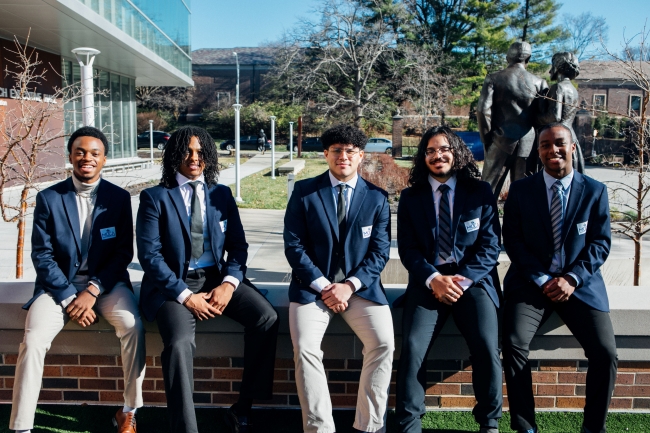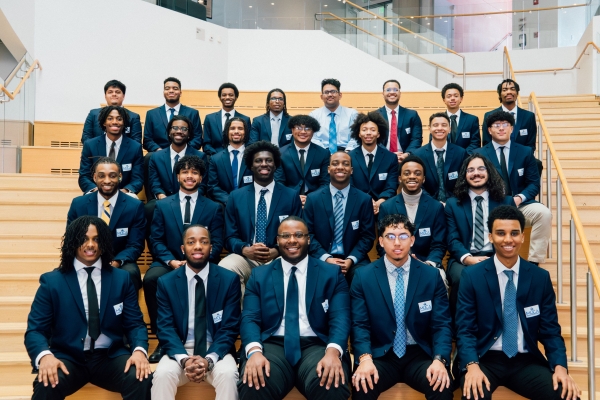You have /5 articles left.
Sign up for a free account or log in.

The Men of Color Academy (MoCA) at UMKC helps young male college students navigate challenges in higher education and promotes growth personally and professionally.
University of Missouri at Kansas City
An inaugural program at the University of Missouri at Kansas City seeks to empower men of color with personalized success coaching, regular group meetings, service projects and academic support.
The Men of Color Academy (MoCA) provides learners a leg up in their college experience, helping them reach their individual and professional goals through academic and career development, as well as contributing to the university’s community of care for equitable access and success for learners.
What’s the need: Nationally, students of color are more likely than their white peers to consider stopping out of college, and this is most true for Black and Latino students.
A 2022 Lumina Foundation–Gallup study found 50 percent of Hispanic students and 40 percent of Black students found it difficult to remain in their program. Over half of Hispanic students and 43 percent of Black students had also considered withdrawing from their program for at least one term.
At predominantly white institutions, like UMKC, students of color are also more likely to report feeling depressed or anxious, which can be tied to a lack of feeling like they belong.
The background: MoCA is a chancellor-sponsored initiative focused on retention and graduation rates for men of color.
“The program is designed to cultivate a supportive and inclusive community for young men on campus, offering targeted academic resources, mentorship, [and] leadership development opportunities to equip them to reach their full potential on campus, but also in life in general,” explains Brandon Martin, vice chancellor and athletics director at UMKC.
Martin sees MoCA as part of a solution toward breaking down stereotypes about men of color in Kansas City and nationally, particularly around the perspectives of nonathlete male students of color and the value they add to higher education.
Martin founded the pilot program in spring 2023 before hiring JaVon Hill, who serves as the program director.
How it works: To join, MoCA students must be a first-year (which could include transfers), male-identifying student and hold at least a 2.75 GPA. Any student meeting those criteria, regardless of race, ethnicity, sexual orientation, expression or ability, can join.
Students complete a two-question questionnaire and submit an application, along with their unofficial transcript. The program is competitive, Hill says, because it’s targeted toward men who are interested in bettering themselves.
“That’s a big thing that they don’t understand at the moment of applying to the university or to the program, but once they are immersed in the program, they understand it a little bit more,” he says.
Once accepted, participants commit to attending monthly programming sessions, doing community service and going to campus involvement events, around five hours per week. All new students also complete REGS 380, Masculinities of Color, in their second semester, which explores how masculinity is impacted by racial and ethnic differences.
Students meet regularly with one of four student success coaches, an older peer or graduate student, who provides support and encouragement, drawing on their own experiences at the university.
Learners can also receive tutoring and have drop-in conversations with Martin and Hill at any time.
“We want them to achieve the highest level of academic success as possible while they’re on campus, but also [make] sure that they feel empowered and nourished at the same time,” Martin explains.
MoCA’s curriculum is centered on three theories, Hill says: Vincent Tinto’s model of student departure, racial and cultural identity development, and faith development theory. These frameworks are woven into the program’s monthly discussion topics, which range from academic achievement and spiritual identity to career development, physical health, campus involvement and community engagement.
“It’s about teaching these young men about themselves, but also the importance of giving back,” Martin says. “We want the students in this program five, 10, 15, 20 years from now to feel like they’re part of a fraternity, in a sense, but more importantly, feel the obligation and the need to give back.”
MoCA also draws on the expertise of other campus offices to facilitate meetings on relevant topics, such as admissions, faculty, student groups or academic affairs.
The impact: MoCA retained 97 percent of its students (all except one, who transferred to another institution) from spring 2024 to fall 2024. Among program participants, the average GPA for fall 2023 was 2.98, and this rose to 3.02 for spring 2024 with the addition of nine new members, Hill says.

The spring 2024 cohort of MoCA had a 3.02 average GPA, and 97 percent retained to the fall 2024 semester.
University of Missouri at Kansas City
A student survey found 94 percent of participants are satisfied with the program over all and a majority feel comfortable within the program, saying the program helped them address specific challenges men face in academia and it helped them grow professionally, academically or personally.
MoCA hosted its new student orientation in early August and will welcome 20 first-time, first-year students and five transfer students this fall, taking its participant total to 60 students.
Both Martin and Hill want to scale the program, expanding on campus among enrolled students, but also reaching out to local high schools to have conversations about college access. To scale, MoCA will need to build on infrastructure, including additional success coaches and funding, as well as leverage relationships that already exist on campus to better serve learners.
The program leaders also aspire to make MoCA a fixture across the University of Missouri system and the country.
“At some point, we want this to be a national model,” Martin says. “We’re still at the infant stage of that.”
If your student success program has a unique feature or twist, we’d like to know about it. Click here to submit.
This article has been updated to correct the organizational structure in which MoCA is housed.




